
I’m fond of the word snark. Its not really a word.
In the United States, most serious artwork and culture is met with a snarkiness. Meaning it is met with a snide, sarcastic, ironic, and self consciously insincere attitude. It is met with attitude. It is met with “attitude”.
This connects in my brain with a certain class of liberal accepting, even welcoming, of fascism.
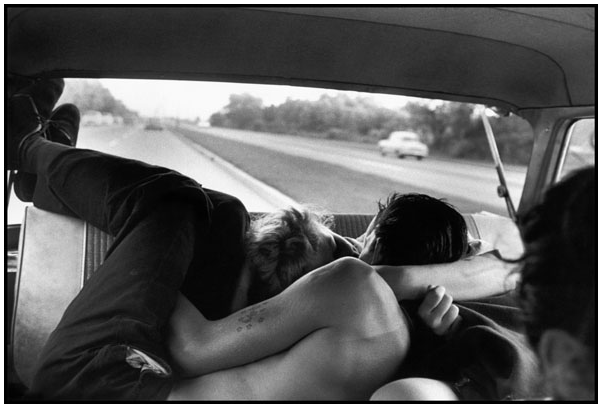
It is almost embarrassing, it seems, to express deep enthusiasm for an artwork. I think its permitted to be enthusiastic yourself, even love the work, experience it with great enthusiasm, but keep it to yourself
However, there is also a sort of dovetailing of this snark with a the new liberal fascists. The tipping point is really NDAA, and drone assassination, but its also expressed now in the very firm public acceptance of the vast prison complex — seven million and counting — and with the new expanded powers of surveillance. Police powers continue to increase. The liberals don’t care about this. They don’t. They care about gun control. They care about gay marriage. They care about organic food, I guess. These are all issues that are incidental to the structural domination of banks, defense, and the government. Americans …a new liberal class….will express support for Obama, even as they post memes attacking Monsanto. The fact that Obama is the largest supporter and defender of Monsanto ever in the White House simply doesn’t register.
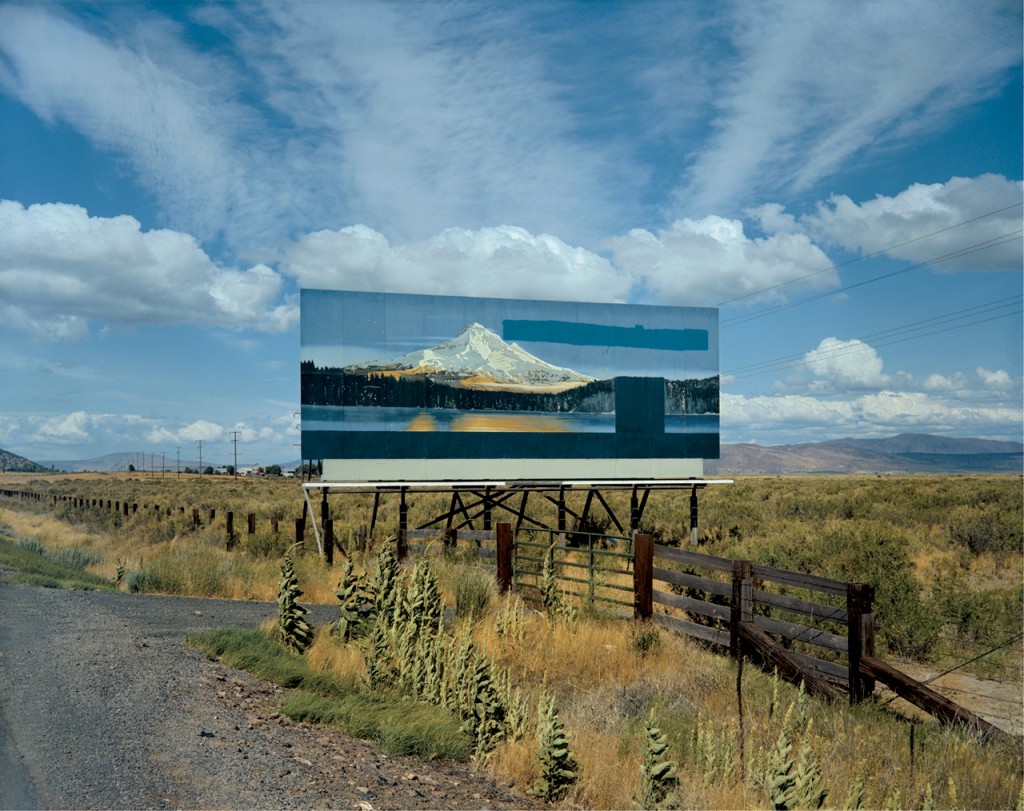
I could list countless contradictions. It is a culture that has developed a capacity for mental reconciliation of contradiction. Of political contradiction. One way of saying this is that the US populace has become very good at compartmentalization.
How does this capacity, this predilection, express itself in artworks? I think one of the ways is with a generalized trend toward consensus. I have discussed this before, but I see it now as more a product of non-reflection — or rather, of short circuiting reflection. The work that might demand a certain reflection are avoided, while there is a quick sort of flow toward the general, the easy to agree upon. Complex ambiguity runs directly counter to corporate themes.
Norman Soloman put it this way
Now, however, is qualitatively different, or rather, the intensification of previous key trends, with still less protest than perhaps at any time since 1933. In broadest terms, America has absorbed its own negativity, and by America I mean a culmination of tendencies toward the systemic integration of capitalism, now at a mature stage of development, and correlative mechanisms of support, previously inchoate or less operant, starting with the bludgeoning of a radical political consciousness through several decades of applied public and private pressures toward conformity: i.e., internalized boundaries of acceptable doctrine and modes of protest.
I will only add, less protest in the more visible strata of the society. There is plenty of protest, or resistance, and certainly of organizing, it’s just not visible because the electronic media censors it by omission.

I was struck by two shows recently, television shows, that seemed to exactly sort of express this consensus snark. White snark. White liberal snark. Both are odious. One is relatively new, House of Lies, and the other is in its sixth season….Californiacation. There is little worth saying, really, about such stuff, except that they are such perfect shows of white snark.
I suspect the audience is sixteen year old boys (it’s really twenty seven, twenty eight, thirty one, year old white men, who are emotionally frozen at sixteen). There is an arch sort of predictable array of cock jokes, pussy jokes, and — in the case of House of Lies — racial cock and pussy jokes because the hopeless Don Cheadle stars (as Marty Kaan….’ya think this character was originally written as black?). What is actually interesting in this is that the setting for this show is a management consultant agency…i.e. agencies who go in and work at improving organizational efficiency in various businesses and corporations. If management consulting were a disease it would be Hep C. In other words its not really a business. Well, maybe it’s more like the guys who sharpened the guillotine.

The first management consultancy agency was founded in 1914. It coincided with the rise of *management* as a specific field of study. The first courses in management were taught as part time evening courses affiliated with Northwestern University, The Kellogg School. Today, degrees are offered in Master of Business Administration (MBA), Ph.D., and Master of Management. The real uptick, however, occurred after WW2, with the Harvard Business School leading the way. In the 1980s the consultancy business was driven by strategy, but in the 90s, the big firms had entered the IT area — and they morphed into the increasingly byzantine world of accounting and auditing. This is PricewaterhouseCoopers; Ernst & Young, and Deloitte Touche Tohmatsu. This is Arthur Anderson and ENRON.

This is the information technology world. The best and the brightest of Ivy League business schools. PricewaterhouseCoopers is the largest management consulting firm in the world, with 180,000 analysts in 159 countries, with, as of 2012, revenue of over eight billion dollars….depending on who’s counting.
The management class, the managers. Now a Showtime snark show.
This leads directly into a whole discussion of the attention economy; the hyper-specialized world of social networks.
Herbert Simon (Nobel Laurerate) wrote:
“… a wealth of information means a dearth of something else – a scarcity of whatever it is that information consumes. What information consumes is rather obvious: it comes the attention of its recipients. Hence a wealth of information creates a poverty of attention, and a need to allocate that attention efficiently among the overabundance of information sources that might consume it.”
So, we sort of come back around to the cultural expression of this. The consumption of product. Efficient attention. There is the need to efficiently *use* leisure time…or what was once called leisure time.
Efficiency equals progress.

There has been a lot written about the economics, mostly from an entrepreneurial standpoint, but less about the cultural and artistic implications. Jonathan Beller, however, was one who did.
Beller:
We can be sure that unless we ourselves develop an antagonistic relation to “the digital” and “digital culture” our creativity, if that’s what it is, will continue to serve that system which structurally guarantees the accumulation of wealth by a tiny minority and the intensifying immiseration of the global majority. Thus, from the standpoint of social justice, any theory of labor/value that does not reckon with structural inequality and the larger contradictions of capitalism is pernicious.

So, one of the ramifications of this is how audiences have adjusted. The new discrimination — the evolving audience for cultural product, is more and more attuned to those places that provide stability in a digital realm of great instability. Obama is the digital age politician, the perfected brand of political leader. The rhetoric of hope, of peace (Nobel Prize), the articulate and viral lawyer, urbane and self assured. The appearance of stability.
The corporate creators of cultural product, even if just instinctively, have learned how to provide an ersatz stability, a sense of community in a sense, a familiarity that touches on the realm of the psychoanalytical. If it makes sense to dissect *reality effects* then it makes sense to talk about *consensus effects*. The most popular shows, for example, increasingly demonstrate signifiers for paternalism and maternalism. They create *controversy* effects, and *safe outrage effects*, and *prestige effects*.
Beller again……
Phenomena such as the cult of the celebrity or the fetish for the painted masterpiece are revealing—the celebrity is not an individual but a social relation characterized by the accumulation of attention, and similarly the masterpiece accumulates the value of all of the gazes that have fallen upon it—inasmuch as they illustrate an important aspect of the attention economy. The productive value of the gaze accretes in the organization of social being, i.e., publicity. This visual economy, the attention of spectators, produces the value, which is to say, the fact of both the painted masterpiece and the media icon. From the practical function of cinema and allied visual technologies we may derive a mediatic model for the extraction of surplus value—one in which spectators work in deterritorialized factories (museums, newspapers, cinemas, televisions, computers) to produce value for media companies and those investors who have a stake in the fourth estate. The cinematic century posited that looking could be treated as value-producing labor; the digital age presupposes it.
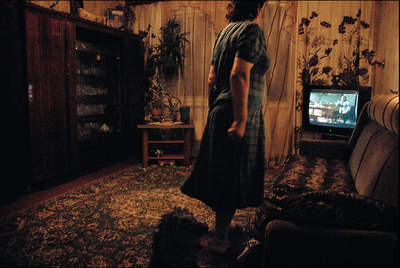
Our daily discourse is ever more enclosed within this system of value production for corporate business. Culture is actually, effectively, erased. This is again, why an analysis of the audience as audience is so important. “House of Lies” is closing the loop even tighter by way of its kistch narrative. The show actually doesn’t have a narrative so much as a series of various *effects*.
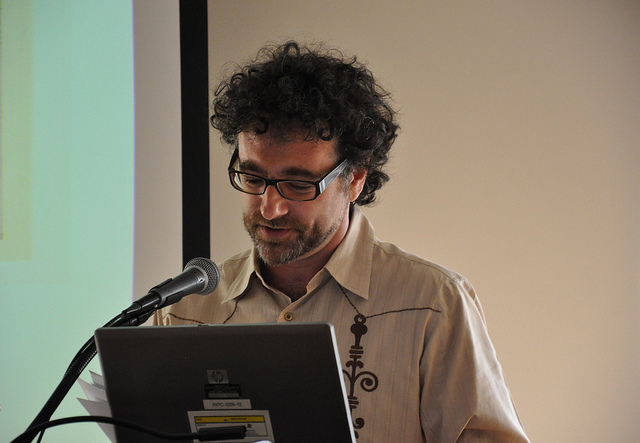
Jonathan Beller
The trickiest part of grasping this, if one is an artist, is in what ways and to what degree, does resistance manifest itself? And what is this, I believe, new relationship to the audience mean?
The connections between cinema, or visuality itself, and our imagination is difficult to calculate…or to process. The fan culture is a deep form for consensus. The snark effect I started with is part of a built-in structural matrix. This is the approved response, the response itself is calculated by the producers of corporate product. Snark is part of what is being asked for. The further extensions of this is something that I expect to continue writing about. I’m not sure any of us are outside it. There is a scary Escher like experiential dimension at work here. There is the marketing of the snarki hipster, the too cool to feel passionately about anything. This is a highly validated sort of lifestyle posture.
Norman Soloman again……
Obama can begin from where the long-term formation of a dissipative consciousness leaves off, extolling “change” as the formula for acquiescence—submission to authority, war, assassination, bank bailouts, military budgets, false either-or alternatives in social policy, whatever it takes to keep the ship of, not state, but monopoly capitalism, on course. Why liberal? Because rhetoric trumps reality, and the attachment of leader and led is bound up in an apolitical moral vacuum, affecting each, altogether resistant to critical thinking and analysis.
Yet more, liberalism has itself demonstrated its bankruptcy, as when, for example, a majority of the American people support the armed drone program. Assassination is cost-effective in protecting America from the Nefarious Other.
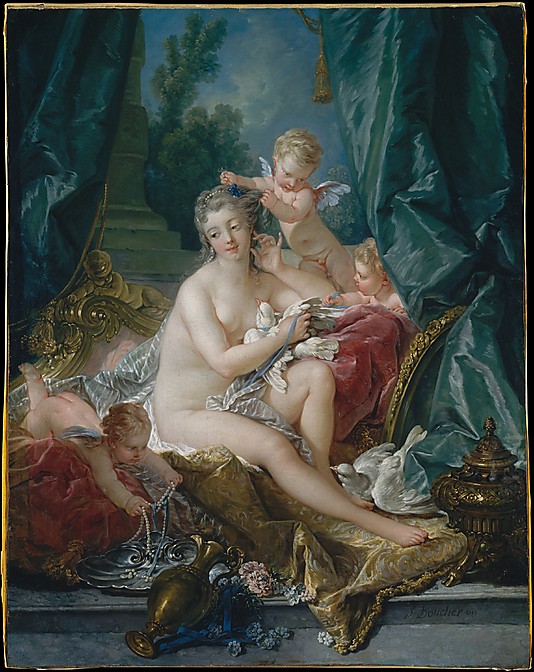
The educated white American now functions from a place of fear. Resistance means learning better to read the effects. The narrative is operating in several registers, and tweezing them apart is often impossible at first look. A sustained ‘looking’ is crucial, and this is, therefore, exactly what is discouraged by the product itself. The quick cuts, the anticipated interruptions, the fragmentation that is anything but fragmentation, all serve to reinforce the shrinking of the imaginary. The unconscious, if that’s what we choose to call it, is colonized.
The pretense of fragmentation is simply an effect like all the rest, because in reality the unity of the message never wavers. It is always appropriate to be snarky. Agreement is prized. Individuality is a popular brand, just don’t be anything but utterly conformist in reality.
History is re-written, and the world is constantly re-imagined in corporate terms. The plethora of awards shows is part of this validating, part of the consensus matrix. Snark is only a minor tick in the great enclosing of discourse. The surveillance state is not just material, it is psychological as well. It is a cultural CCTV world of Orwellian dimensions.
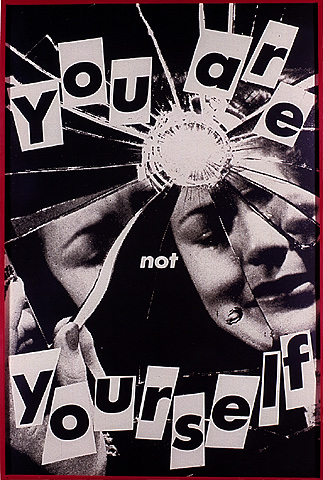

This is a great post, John, and strangely pertinent. One of the things I find remarkable about the current state of things among the LA artists I know is the near total absence of engagement with political realities. The vocation of the artist has become a social exersize low on risk. Resignation is the other side of the snarkiness and the kitsch you mention, which you correctly identify with the root affect of fear. If you don’t look, don’t breathe, don’t move…perhaps the t-rex of the Corporate State will go away…or choose somebody else. The instruments of social control have been finely calibrated to a point where they can be borne without any conscious awareness. All the wires are tucked away out of view. And what makes Obama pernicious is the way he fosters the impression of progressivism even while continuing the low-grade fascism you describe. One keeps looking for the shift that only comes, evidently, with calamity of some kind or another and even then there’s a sense that all bases are covered and the forces of hierarchy and control vigilant and deeply entrenched. With respect to forums like this I suppose the issue has to do with finding new ways to view the situation that will normalize resistance and tap into or activate underlying reservoirs of communal affect…a case can be made that’s what art is about…but…well…
Thanks Guy, and you make a great point about risk. That’s the management theme, again, that runs through so much of this. Risk avoidance. Culturally this means simply business. Though to a degree its controversy of the wrong sort. And yes, the finely calibrated control mechanisms……so normalized now, so seamless —that I think this is partly what I was trying to get at……..so normalized, so inculcated, that they come now, with a new generation, to be embraced…searched for, as part of the validating process.
John, I have a bit of a quibble with your characterization (& others’) of “liberals”. A distinction should be made between liberals and Democrats, between ideology and hackery. It’s true that many Democrats think of themselves as “liberal” and “progressive”; I can think of myself as Cary Grant’s doppleganger but that doesn’t make it remotely accurate.
And the distinction is important because there are, if not enough, progressives who have opposed what Obama has done. It’s also useful for calling out the hypocrisy and ghastly & destructive policy. There are indeed plenty of folks who whined about George Bush’s policies only to discover that Obama’s codification– and staggering expansion– of many of them is just peachy (what Magna Carta?). These folks are flacks, tribalists, Obama loyalists & apologists– but surely not liberals.
@chris
Well, a lot of people quibble with this. But adorno called liberalism the handmaiden to fascism. Its still supportive of a capitalist state………and we’re talking ideology here. The sense of liberal came originally from the enlightenment, but in the 20th century, from Keynsian economics………..after the great depression. In any event, the idea of democracy, equality (sort of) and autonomy……were more or less the bedrock values. The problem is that in a system of exchange and market restraints, the rhetoric masks the reality. Which is what ideology does after all. Here is a bit from adorno and horkheimer…..”Even the best-intentioned reformers who use an impoverished and debased language to recommend renewal, strengthen the very power of the established order they are trying to break. ”
in other words…………..reform isnt reform. The system is structured for war, stagnation, gulags, and economic crises…….meaning more war and after that more war again. Poverty is the pre condition for continued expansion. So…………….I still stick by the term liberal. But if you can explain why you see them as different from obama loyalists, please do so. Thanks.
John,
I don’t know if Glenn Greenwald identifies as a liberal but his views on jurisprudence are in the mainstream of liberal legal thought. Or at least they were, shared in large part by one Senator Obama, et al, pre-2009.
Krugman is a liberal; it’s testament to the appallingly dishonest atmosphere that he’s portrayed as Marx with a better groomed beard.
They are both outspoken Obama critics. Their views are updated New Deal economics & basic Supreme Court case law. (& not just the Warren Court). Such policy is hardly radical, it is, for lack of a better term, liberal & could have significant positive effect (even though, as you note correctly, the system is still rigged for ill effect.) But Obama does what he does & the hacks flack & apologists rationalize.
In theory, I quite agree with you– and the Adorno quote; in terms of the practical, I’m not as convinced of purity over plausibility.
I think we’re arguing over semantics in a sense. I’m not sure greenwald could be called a liberal at this point —- and belief in due process isn’t only a liberal belief. We have to seperate the material world from the ideological on this one. Krugman IS a liberal. He comes down on the side of reform. He thinks rational planning in a basically irational system would change things.
I think greenwald understands far better than krugman how ideology works. His article on american exceptionalism was excellent on this point. And in practical terms, I’m with you —-the purity motiff is a leftover bit of leftist narcissism —the failed trotsky-ists who will attack chavez as not being a “real socialst”. This is the realm of louis proyect and the like. The tenured (or the attemtping tenure) academic left often feels this way to me. http://www.guardian.co.uk/commentisfree/2013/feb/18/american-exceptionalism-north-korea-nukes
Good points Guy. Snark is safety. Has been co-opted to be safe. That wonderful piece in SB Nation about the ex boxer who “trains” Wall Street guys at the fight gym in Manhattan mentioned how the two guys featured in the hilarious video were 1) a producer from the Daily show, and2) an Ad agency excec. It hit me that many of the “1%” love to sit at the bar and be teased. Love to watch Stewart and Colbert make fun of them. Comedy offers a safe way to deal with this side of the truth, and its most successful when it does so in a non threatening way. Pryor, Rock, Louis C.K all carry with them the paranoia that they are going too far because they know they are.
John,
Appreciate the dialogue. Greenwald is typically excellent, exceptional I’d go so far as to say…
I’d add though that GG’s points in that post- and in general- were cheered & substantially agreed with by many Dems, liberals (even Obama) in 2008. That they’ve been rationalized away by so many is tragic. (As I recall GG has also pointed out that such Dems & liberals should apologize to George Bush.).